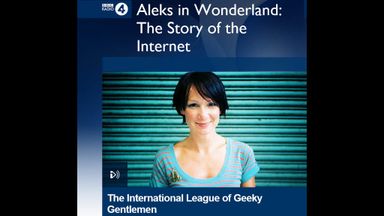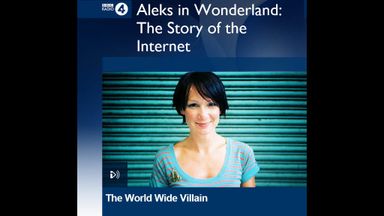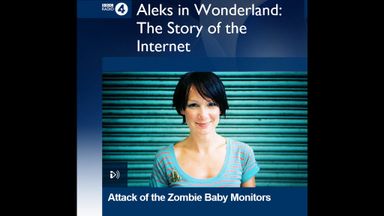Aleks in Wonderland: The Story of the Internet
2. The World Wide Villain
Clips from this programme
Introduction: The internet and the World Wide Web: Stamp out online crime: Home Computers, Micro Live OWL001, Telecom Gold Hack in 1984, Mac (Ian McNaught Davis), Passwords on the internet, anonymity (Aleks Krotoski)
Duration: 03:36Tim Berners Lee, describes how his free World Wide Web WWW invention was needed to link programs together on the Internet. Dame Wendy Hall: Internet grows because of the content on it. Web Browsers and Windows 95. Amazon launched in 1994, Google in 1998. Wi-Fi and broadband, e-commerce in 2000's, Facebook (2004), Twitter (2008), people and businesses online
Duration: 03:261999> 2000, the Millennium bug: The Computer Revolution became more real in 1999 with the web; computer chips in everything and all our lives, buying and even dating online, as predicted by Tim Berners Lee. Data was valuable, Russian Scud Missiles
Duration: 03:31Dame Wendy Hall: Internet and the WWW World wide web used for good and for bad. The Web is an application sitting on top of the internet but the Web has poor security measures within its design
Duration: 02:57Computer Infection types: Worms (with a payload such as Spyware or a Virus) the online PC infected by clicking on a link or email attachment, Botnets, Trojans, Ransomware (encrypting users data, released by payment). Backup your data!
Duration: 03:16NHS Cyber-attack by Hackers' ransomware in 2017: Online PC infection via the networked super-highway, internet connected computers: COBRA, security patches for bugs needed to be installed. The encryption key to unlock ransomware locked data given on payment of the ransom.
Duration: 02:43Bad stuff happening online? The Net is a reflection of wider society: porn, gambling, fake news, used for propaganda, bullying, conning innocent people, a world wide web of media nodes broadcasting everyone's messages, thanks to Tim Berners Lee. James Foley beheading by terrorists online, spreading fear online via social media
Duration: 03:31Spreading fear online via social media - Bill Clinton's 1996 Telecommunications Act for the digital age, and the decency act & section 230. Owner of website services are not responsible for the content put on their service by other people including terrorists. EU have similar laws covering web hosts: until illegal content is highlighted to the host, then it must be removed. Illegal online content is still proliferating
Duration: 04:39Aleks in Wonderland: The Story of the Internet
1. The International League of Geeky Gentlemen
First broadcast: 16th August 2017
Duration 27:53
Just how did the Internet become the most powerful communications medium on the planet, and why does it seem to be an uncontrollable medium for good and bad? With no cross border regulation the internet can act as an incredible force for connecting people and supporting human rights and yet at the same time convey the most offensive material imaginable. It has become the most useful research tool on earth but also the most effective way of delivering threats to the security of governments, the health service and on a personal level our own identities. In this series Aleks Krotoski unravels the complexity of the internet, meeting the people who really invented it, looking behind the myths and cultural constructs to explain what it actually is and how it came to exist outside of conventional regulation. We'll ask whether the nature of the net itself really is cause for concern - and if so what can be done to reign in the negatives of the internet without restricting the positives? In this first episode we go back to the days before the internet to look at the cultural and technological landscape from which it grew, and unravel some of the key moments - now lost in time and obscured by technology folklore, which mark when the internet lost its innocence.
2. The World Wide Villain
First broadcast: 23rd August 2017
Duration 28:04
With the coming of the World Wide Web in the 1990s internet access opened up to everybody, it was no longer the preserve of academics and computer hobbyists. Already prior to the web, the burgeoning internet user groups and chatrooms had tested what was acceptable behaviour online, but access was still limited. Aleks Krotoski asks whether the Web through enabling much wider use of the internet is the villain of the piece in facilitating not just entertainment and commerce, but all aspects of the darker side, from malicious computer hacking attacks, worms and viruses, to new channels for criminality, online extortion and identity theft.
Now playing
3. Attack of the Zombie Baby Monitors
First broadcast: 30th August 2017
Duration 27:56
Can we Control the Dark Side of the Internet?The Internet is the world's most widely used communications tool. It's a fast and efficient way of delivering information. However it is also quite dumb, neutral, treating equally all the data it passes around the world. From data that forms scientific research papers, the wealth of social media to keep us all connected with friends and relatives, entertainment or material we would rather not see- from political propaganda to horrific violence, the Internet makes no distinction. Is it time to change that? And can we? In this programme Aleks Krotoski looks at whether it's possible to use technological fixes to regulate the internet or whether a more political approach is needed to governance of this vital but flawed communications medium











